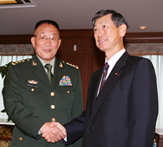Cao Gangchuan recently completed the first visit by a Chinese defense minister to Japan since then-minister Chi Haotian made such a trip in February 1998. During Cao's five-day sojourn, he met with senior Japanese political and military leaders, including the new Japanese Defense Minister, Masahiko Komura. Cao's visit to Japan helped advance the modest détente that has characterized Sino-Japanese relations since Shinzo Abe became Japanese prime minister in September 2006. Abe has prioritized improving the ties between China and Japan, which had deteriorated sharply under his predecessor, Junichiro Koizumi. Cao invited Komura to make an official visit to China sometime next year. The most interesting feature of the talks between the two defense establishments concerned their plans for Sino-Japanese military confidence-building measures. For several years, the two countries have discussed expanding defense exchanges and establishing a direct military-to-military hotline. Later this year, a Chinese warship is scheduled to dock at a Japanese port for the first time since World War II. The Japanese navy is preparing for a reciprocal port visit to China sometime next year. The two ministers also discussed the possible presence of Japanese monitors at a Chinese military exercise next month.
Chinese Military Spending Remains Obstacle to Sino-Japanese Détente

